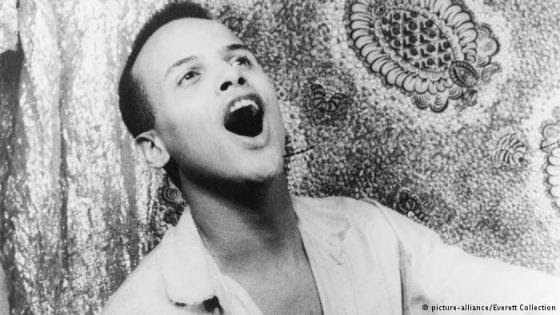
A report by Silke Wünch for DW.com.
Harry Belafonte, who turned 90 on March 1, spoke out against
racism and injustice before the civil rights movement. As a musician, he
sold millions of records.
He
was a singer, actor and entertainer - but also an activist for peace
and human rights. Harry Belafonte isn't only known for his light calypso
sound that conquered the pop music world in the 1950s, but also for his
commitment to the struggle against racial discrimination,
marginalization, hunger, and poverty.
He
was born in the New York district of Harlem to a sailor from the
Caribbean island of Martinique and an unskilled worker from Jamaica.
His father, who used to drink a lot, often beat his children - at times
so badly that they ended up in the hospital. Finally, his father left
the family, and his mother returned to the Caribbean with Harry and his
siblings. Harry was given into the care of his grandmother with the
following words: "Don't let a single day pass by without making use of
opportunities to fight for justice."
Some
years later, Harry Belafonte returned to New York, where he attended
high school and dreamed of a career on stage. That, however, was
particulary challenging in 1950s US, where racial segregation was still
practiced, and people of color were not welcome in the limelight. But
Harry refused to let himself be put off by that. He continued to prove
his talent as an entertainer until he finally got a job in a renowned
jazz club.
Belafonte's steep career
Then
things developed very quickly for Belafonte. After he got his first
role in the movie "The Bright Road" in 1954, he made his breakthrough as
an actor in "Carmen Jones" one year later.
He followed that up with his first record contract. His song "Mathilda"
instantaneously became a hit. In 1956, his album "Calypso" was released
and sold more than a million copies - a huge and almost miraculous
success, especially for a musician of color at that time. From then on,
Harry Belafonte was seen as the "King of Calypso." His "Banana Boat
Song" made him a musical icon at a young age.
Belafonte
made use of his popularity in order to express his clear stance against
racism and discrimination. In 1957, he shot the film "Island in the
Sun," a love story between a black man and a white woman - which proved
to be a scandal. Also in real life, he transgressed racial boundaries by
marrying a white woman.
Messenger for peace and justice
Harry
Belafonte has always been more than just a good-looking singer with a
soft voice who sold 150 million records and starred in numerous movies.
Without regard for the consequences it could have on his career, he
continued to advocate human rights, struggling for minorities like
African-Americans and Native Americans, as well as against apartheid in
South Africa, the Vietnam War and nuclear armanent in the 1980s.
Resulting from his continued commitment to the fight against poverty and
hunger in the world, he was finally appointed a UNICEF ambassador.
His
90th birthday on March 1, 2017, sees the release of a comprehensive CD
entitled "When Colors Come Together - The Legacy of Harry Belafonte." It
presents his most popular and important songs selected by Belafonte
himself. He wanted to make sure that the selection of songs would
reflect his social commitment.
No comments:
Post a Comment